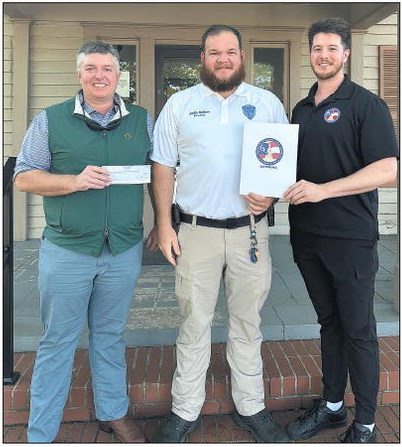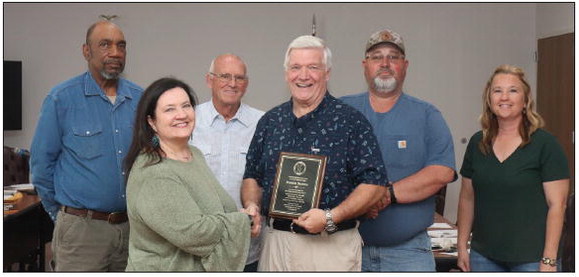Vidalia Doctor Joins Mission Team Rendering Aid in Ukraine
When Vidalia physician Geoff Conner and four others from Discipling Ministries InternationaI (DMI) visited wartorn Ukraine recently, they were eye witnesses to the devastation caused by Russian aggression that is now approaching its fifth month. Dr. Conner said that while he was broken hearted to see what the Ukrainians had endured, he was impacted by the fact that the Ukranian people are not ready to give up; in fact, they are determined that they will reclaim what has been taken from them —and eventually recover.
As he and members of the DMI team joined their Ukrainian friends to survey the aftermath of Russian attacks on towns and villages, Dr. Conner said he felt “disappointment in humanity, sadness and anger” in what he saw. A 23-year-old Ukrainian in their group shared that his dominant emotion was anger. “They have not lost their spirit, far from it. They are still fighting,” Dr. Conner observed, adding, “But there is still a lot of uncertainty. When we talked about DMI returning in November on another continued from page
mission, one of the Ukrainians in our group said, ‘If you are still able to return.’ It is still a fluid situation.”
Dr. Conner, who donates medical services for DMI, and three other DMI representatives were in Ukraine for two weeks in May. Their mission was to take cash donated through DMI for distribution in Ukraine. “Wire transfers are not reliable and there is a fee attached,” Conner said. DMI wanted to put the money directly into the hands of the people who need it most.
“Our other goal was to do a survey to find out the needs of the Ukrainian people. You see things on the news, but we wanted to see first-hand,” Dr. Conner said. Also on the mission trip were DMI founder Rev. Pat McCoy, DMI Director Rev. Dean Robbins and RN Diane Simms.
One hundred percent of the donations collected through DMI will go directly to Ukraine for humanitarian needs like repair of destroyed homes, medical help and refugee resettlement. One of the DMI team’s immediate objectives was to get the donated funds to Light of the Resurrection (LOR), a ministry sponsored by DMI and now based in the capital city of Kyiv.
“Local business people had been loaning money interest-free to LOR so it would have access to cash to help people, but that money had to be paid back,” Dr. Conner explained. One of these business people was the owner of a pharmaceutical company headquartered in Kyiv which supplies medical products for Ukraine. “We carried over a large sum of cash split among the four people who went on the trip, so we could safely get across the border,” Dr. Conner said. The DMI team also brought medical supplies, including three trauma bags donated by the Toombs-Montgomery EMS. Tumi Outlet Store in Vidalia donated six pieces of luggage to leave in Ukraine for refugees, and Vidalia’s City Drug, Allcare, Phillips and Walker pharmacies donated medical supplies.
Since commercial flights are not going into Ukraine, the DMI team flew into Krakow, Poland, two hours away from the Ukrainian border. After being picked up at the airport, the team headed across the border to the city of Rivne in northwestern Ukraine where hotel rooms awaited them. The group had a four-hour wait in line to
OKSANA operates “Happy Home” orphanage for children with special needs. She fled her city apartment with her charges for the relative safety of her parents’ home in a rural area. She has one assistant to help her care for nine children.
cross the border, and encountered a two-mile-long group of Ukranians trying to get back home after the Russians were beaten back several weeks ago. The trip into Ukraine turned out to be a 12-hour struggle. As they unloaded their bags from the car at their destination, the DMI team heard air raid sirens go off, but because their Ukrainian companion was not alarmed, they did not feel threatened, Dr. Conner said.
Their mission in Ukraine led the DMI representatives to an orphanage for special needs children that LOR had been supporting. The “Happy Home” orphanage had moved from an apartment in Kyiv to a rural location where the children slept in the home of the director’s parents. The children were able to venture from the home to a playground across the street for daytime activities. “That director, Oksana, really had a heart for those children to be working in those conditions,” Dr. Conner said. The director had one assistant to help her care for nine children. “We gave her funds because a lot of the support she had received came from the Ukrainians stopped because of the war.” The team also visited a poor, rural area where a church summer camp was based. At the time, the shelters were housing refugees. The team met with the pastor supervising the site, provided medical care, and dispensed medicine.
In the relatively wellpopulated city of Uman, outside of Kyiv, the team visited a church which was feeding 500 refugees each day. Warehouses at the site had been stocked with provisions sent in by Samaritan’s Purse, an American Christian charity, which were being used to fill food bags for the hundreds of people who came to the church parking lot each day. There were only 11 volunteers on the assembly line bagging the food, but these volunteers had organized efficiently to carry out their mission, Dr. Conner said. A pharmacist was part of that 11-person volunteer group, so the DMI team left medical supplies as well as funds to assist that effort.
The DMI group traveled through landscape that had been bombed by Russian troops six to eight weeks prior. Checkpoints help secure the countryside and caution is still the watchword, Dr. Conner said. In one rural village, as they surveyed the remains of a drug and alcohol addiction clinic, the group was confronted with the brutality wrought on the Ukranian people.
One of the clinic’s buildings was completely flattened and the other was heavily damaged by shelling from Russian tanks which had been positioned in a field across from the village. “There was no strategic value at all,” Dr. Conner said of the destruction. Yet, in the face of the assault, the Ukrainians had persevered. A display at the village checkpoint was a testament to the indomitable spirit of the Ukranian people. In a touch of what Dr. Conner called “lightheartedness in the midst of tragedy,” the Ukrainians displayed a manikin wearing military garb and holding a Ukrainian flag atop the checkpoint bunker— as if to thumb their noses at the Russians.
The DMI team did not feel endangered as they crossed the countryside. “We weren’t close to combat zones; we did not treat any wounded. We never saw actual fighting; it was more the aftermath,” Dr. Conner said. What they witnessed was Ukrainians trying to restore normalcy.
A pharmacist the team encountered said that shortages experienced early in the war were slowly abating. A lot of displaced refugees were still in need, however, because they had no money with which to buy medicine. There was also a shortage of medical care since a lot of Ukranians with medical skills had left the country after fighting erupted or had been repurposed for military duty.
The medical care varies from area to area. “Some places don’t have any medical care because they have other priorities. There are various parts of the country intact with business going on as usual and there are pockets where help is needed. Many people are migrating to Eastern Ukraine, and this places a strain on those areas of migration.”
Through his mission work, Dr. Conner has made several trips to Ukraine. DMI first connected with Ukraine when Russia fell apart about 1992. DMI began work in Ukraine in 1993, and Dr. Conner was recruited about 10 years ago by a Vidalia pediatric nurse practitioner named Sam Oates. Dr. Conner and Oates were part of a medical team that augmented continued from page
the mission work of DMI. Their job was to provide medical evaluations and medicine to the people of Ukraine through mobile clinics set up in the rural areas of the country.
Dr. Conner traveled to Ukraine in February 2020, just prior to the worldwide health pandemic when mission trips ceased for a while. Since 2020, Dr. Conner and other members of the mission group kept in close contact with the friends they left behind in Ukraine, including Sasha (who asked that his last name not be used for safety reasons), who operates LOR.
Dr. Conner explained that Ukraine is predominantly Christian, with both Eastern Orthodox and Protestant churches spread across the country. He pointed out that churches provide a prominent social network, and it’s important that they continue to function, which is one of Sasha’s, LOR’s and DMI’s objectives.
“We have kept in close contact with people like Sasha who run the home bases for the missions,” Dr. Conner said, adding that helping these people to fly below the radar is critical so that they won’t be targeted by the Russians.
After being displaced from Doneskt when war broke out, Sasha moved to Kyiv where he and his family still live. “These are stressful times for them, needless to say, but they are persevering and carrying on with their ministry,” Dr. Conner said. “Sasha’s home is nice and in a decent neighborhood, but his neighborhood organization has given him instructions on being armed and even supplied a recipe for Molotov cocktails,” Dr. Conner added. Sasha has several Molotov cocktails at his home, just in case they are needed. After their experience in Doneskt, Sasha and his family realize how quickly their lives could be disrupted again.
“Emotional support is important to show them that people are behind them. They were very appreciative we were there,” Dr. Conner said.

CHURCH SERVICES are often conducted wherever there is a safe location. This service was at a refugee camp.

FOR UKRAINE – A Tumi worker arranges six pieces of luggage that the Vidalia-based company donated for Ukranian refugees.

HIGH RISE DAMAGE – A highrise apartment building took a direct hit by enemy shelling. (Inset) A closeup look at the damage.

FEEDING THE MASSES – A church in Uman with just 11 volunteers is preparing and dispensing 500 bags of food each day to stave the hunger of the masses of refugees.

CHURCH IN UMAN – The DMI team donated funds and medical supplies to the church to assist its mission to render aid to Ukranians displaced by war. The church receives food donations from Samaritan’s Purse.

TRAUMA BAGS DONATED – Drew James, EMS Director for Toombs-Montgomery EMS, hands over one of the three trauma bags donated for the people of Ukraine. Dr. Geoff Conner, who was among four representatives of DMI to travel to Ukraine recently, receives the gifts for distribution.

UNDFEATED – A guard stands outside this checkpoint near a country village where Russian shelling demolished a clinic. The indomitable Ukrainians managed to exhibit humor in the face of tragedy as they mounted a manikin attired in military garb and holding a Ukranian flag atop the checkpoint bunker.

CASUALTY OF WAR – The neighboring towns of Irpin and Bucha are separated by a river. This bridge linking the towns was a target.

DEFENSELESS – This multi-story maternity hospital should not have been a target, but Russian troops ruthlessly aimed to destroy it. The DMI team viewed the damage outside of Kyiv as they drove toward Irpin on a modern, four-lane highway.

MINE FIELD – A sign warns passersby that they are close to a mine field.

READY – Ukranian people are ready for the unthinkable. They have been taught how to use weapons and been given directions for making Molotov cocktails.








